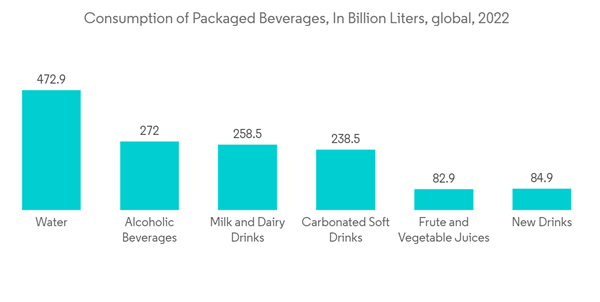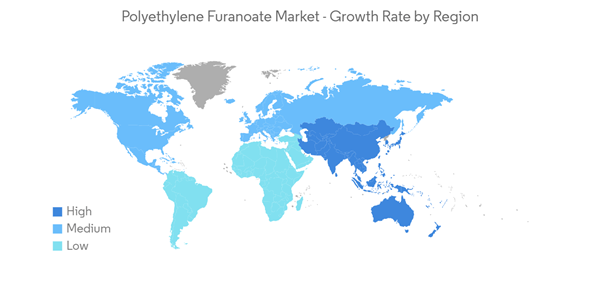The market was negatively impacted due to COVID-19. Owing to the pandemic, several countries worldwide went into lockdown to curb the spread of the virus. The shutdown of numerous companies and factories disrupted worldwide supply networks and harmed global production, delivery schedules, and product sales. Currently, the market recovered from the COVID-19 pandemic and is increasing significantly.
Key Highlights
- Major factors driving the market studied are the increasing demand for polyethylene furanoate for bottle manufacturing and the rising demand from the fibers segment.
- On the flip side, the presence of other bioplastics such as bio-PET, bio-PE, bio-PP, etc., and the unavailability of raw materials are the major restraints expected to hinder the market's growth.
- Growing demand for bio-based polymers in the medical sector is expected to offer various lucrative opportunities for market growth.
- The Asia-Pacific region dominated the global polyethylene furanoate market, with the largest consumption from countries such as China and India.
Polyethylene Furanoate (PEF) Market Trends
Increasing Demand from Bottles Segment
- Polyethylene furanoate is increasingly used in applications such as bottles due to its high strength, puncture toughness, and good heat resistance.
- Polyethylene furanoate also increases oxygen and carbon dioxide resistance, preventing food products from oxidizing. It is increasing the demand for polyethylene furanoate in the food & beverage industry and consequently boosting its market growth.
- The food and beverage sector is one of the largest manufacturing industries in Europe and the major consumer of bottles manufactured. According to FoodDrinkEurope, the food and beverage industry turnover increased by 2.3% in Q4 2022, compared to the previous quarter, and increased by 19.2% Y-o-Y compared to Q4 2021.
- Furthermore, European Union exports of food and drinks were valued at EUR 48.3 billion (~USD 50.9 billion) in Q4 2022, registering a growth rate of 17.5% compared to Q4 2021. This growth in food and drink exports greatly impacted the industry's bottle demand.
- According to the Department for Environment, Food, and Rural Affairs, the number of beverage-manufacturing SMEs in the United Kingdom accounted for 1.61 thousand, along with 30 large beverage businesses. With the growing companies, the demand for bottles made from sustainable material would also increase, thereby affecting the polyethylene furanoate market.
- Therefore, growing demand for bottles in the packaging of beverages such as water, soft drinks, fruit juices, and alcoholic beverages is likely to propel the polyethylene furanoate market during the forecast period.
Asia-Pacific Region to Dominate the Market
- Asia-Pacific region is expected to dominate the market for polyethylene furanoate during the forecast period. In countries like China, India, and Japan, owing to the rising demand from various end-user industries, including food and beverage, packaging, textile, and automotive, the demand for polyethylene furanoate is increasing in the region.
- Due to rising environmental concerns, the growing trend and awareness of bio-based bottles, films, and fibers are anticipated to propel the polyethylene furanoate market in the region as it is a 100% bio-based recyclable polymer extracted from plants.
- According to the National Bureau of Statistics of China, 59.12 million metric tons of non-alcoholic beverages were produced in China during the first four months of 2023. The production of non-alcoholic beverages in April amounted to 14.55 million metric tons, approximately 3% more than the previous year's production for the same period. It would eventually enhance the demand for bottles made from PEF during the forecast period.
- Moreover, according to the Asahi Group Holdings in Japan, during 2022, the majority of the market share of soft drinks was acquired by ready-to-drink tea (30%), followed by ready-to-drink coffee (18%), carbonated drinks (15%) and mineral water (14%). The rest of the share was distributed among fruit juice, lactic drinks, and others.
- Polyethylene furanoate fibers are recycled from polyethylene furanose-based bottles and are used in processing 100% biobased t-shirts. These fibers are used in packaging industrial products like fertilizers and pesticides. They are also used in carpets, clothing, and sports apparel.
- According to the National Bureau of Statistics of China's monthly report, the country produced around 2.75 billion m of clothing fabric in April 2023. The overall textile production in the nation from January to April was little more than 10.8 billion, as stated in the report.
- Thus, the factors above, coupled with government support, are contributing to the increasing demand for polyethylene furanoate during the forecast period.
Polyethylene Furanoate (PEF) Industry Overview
The polyethylene furanoate market is highly consolidated, with top players accounting for a major market share. Some of the key companies in the market include Avantium, Toyobo Co., Ltd., Sulzer Ltd., AVA Biochem AG, and Swicofil AG.Additional Benefits:
- The market estimate (ME) sheet in Excel format
- 3 months of analyst support
This product will be delivered within 2 business days.
Table of Contents
Companies Mentioned (Partial List)
A selection of companies mentioned in this report includes, but is not limited to:
- TOYOBO CO., LTD.
- Avantium
- AVA Biochem AG
- Corbion
- Swicofil AG










